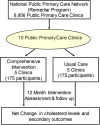Educational intervention to improve effectiveness in treatment and control of patients with high cardiovascular risk in low-resource settings in Argentina: study protocol of a cluster randomised controlled trial
- PMID: 28143840
- PMCID: PMC5293870
- DOI: 10.1136/bmjopen-2016-014420
Educational intervention to improve effectiveness in treatment and control of patients with high cardiovascular risk in low-resource settings in Argentina: study protocol of a cluster randomised controlled trial
Abstract
Introduction: Hypercholesterolaemia is estimated to cause 2.6 million deaths annually and one-third of the cases of ischaemic heart disease. In Argentina, the prevalence of hypercholesterolaemia increased between 2005 and 2013 from 27.9% to 29.8%. Only one out of four subjects with a self-reported diagnosis of coronary heart disease is taking statins. Since 2014, statins (simvastatin 20 mg) are part of the package of drugs provided free-of-charge for patients according to cardiovascular disease (CVD) risk stratification. The goal of this study is to test whether a complex intervention targeting physicians and pharmacist assistants improves treatment and control of hypercholesterolaemia among patients with moderate-to-high cardiovascular risk in Argentina.
Methods and analysis: This is a cluster trial of 350 patients from 10 public primary care centres in Argentina to be randomised to either the intervention or usual care. The study is designed to have 90% statistical power to detect a 0.7 mmol/L reduction in low-density lipoproteins cholesterol from baseline to 12 months. The physician education programme consists of a 2-day initial intensive training and certification workshop followed by educational outreach visits (EOVs) conducted at 3, 6 and 9 months from the outset of the study. An on-site training to pharmacist assistants during the first EOV is performed at each intervention clinic. In addition, two intervention support tools are used: an app installed in physician's smartphones to serve as a decision aid to improve prescription of statins according to patient's CVD risk and a web-based platform tailored to send individualised SMS messages to patients.
Ethics and dissemination: Ethical approval was obtained from an independent ethics committee. Results of this study will be presented to the Ministry of Health of Argentina for potential dissemination and scale-up of the intervention programme to the entire national public primary care network in Argentina.
Trial registration number: NCT02380911.
Keywords: Cardiovascular Risk; Good Clinical Practice Guidelines; MEDICAL EDUCATION & TRAINING; Statins.
Published by the BMJ Publishing Group Limited. For permission to use (where not already granted under a licence) please go to http://www.bmj.com/company/products-services/rights-and-licensing/.
Conflict of interest statement
Competing interests: None declared.
Figures
References
-
- Global health risks. Mortality and burden of disease attributable to selected major risks. Geneva: World Health Organization, 2009.
-
- Farzadfar F, Finucane MM, Danaei G et al. . National, regional, and global trends in serum total cholesterol since 1980: systematic analysis of health examination surveys and epidemiological studies with 321 country-years and 3.0 million participants. Lancet 2011;377:578–86. 10.1016/S0140-6736(10)62038-7 - DOI - PubMed
-
- Stone NJ, Robinson JG, Lichtenstein AH et al. . 2013 ACC/AHA guideline on the treatment of blood cholesterol to reduce atherosclerotic cardiovascular risk in adults: a report of the American College of Cardiology/American Heart Association Task Force on Practice Guidelines. J Am Coll Cardiol 2014;63:2889–934. 10.1016/j.jacc.2013.11.002 - DOI - PubMed
Publication types
MeSH terms
Substances
Associated data
LinkOut - more resources
Full Text Sources
Other Literature Sources
Medical




